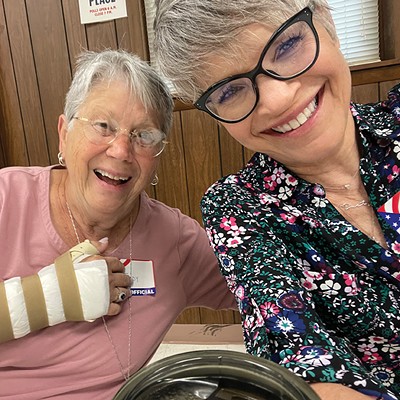Springfield Police Department Detective Jim Graham showed up intoxicated at three crime scenes, ate pizza with his partner at a murder victim’s dining table in a room later determined to be the scene of the crime, and once stepped in a puddle of blood with his flip-flops, according to an Illinois State Police report obtained Tuesday by Illinois Times. His partner, Paul Carpenter, created a phony community-service record to reward a snitch for helping him solve a murder, the same report states.
Dated Sept. 19, 2005, this seven-page preliminary report provides the first official glimpse into allegations against SPD Detectives Graham and Carpenter, formerly assigned to a special investigative division previously known as the major-case unit. The two detectives have been on paid administrative leave for more than six months, pending the results of the ISP investigation.
Prosecutors who reviewed the initial investigation have declined to bring criminal charges against either cop, and their supporters -- though reluctant to speak on the record -- insist that they’re good cops who should have regained their badges. Their attorney, Ron Stone, did not return a phone call. This preliminary report was based solely on interviews with other officers and witnesses; Carpenter and Graham were not interviewed by ISP until last month.
The ISP report originated as a probe into a 20-page memo submitted to SPD Chief Don Kliment in February 2005 by Ron Vose, who was then supervisor of SPD’s narcotics unit. However, the ISP document does not track Vose’s complaint directly; it ignores some of his allegations and amplifies others.
For example, Vose’s memo -- also obtained Tuesday by Illinois Times -- mentions Graham’s flip-flops only briefly, in the context of an October 2004 meeting of Criminal Investigations supervisors. According to Vose’s memo, Sgt. Bob Oney said several detectives had complained that Graham received preferential treatment, including being allowed to wear “inappropriate attire” like flip-flops.
But in the ISP memo, this allegation expands to encompass the complaints of other unnamed officers, who told ISP investigators about Graham once “walked through a puddle of the victims’ blood and contaminated the crime scene with bloody footprints.” The incident was reported to then-Chief John Harris, who requested an internal affairs investigation. But ISP investigators found no such case among IA files.
Vose’s memo also outlined a conflict between Carpenter and a probation officer regarding a phony timecard Carpenter provided for a probationer who had become his informant. Illinois Times reported in March that Carpenter faxed the phony community-service timecard to probation officers in another state for the benefit of a Springfield man who had given Carpenter a tip [see “Something doesn’t add up,” March 2]. The ISP preliminary report states that Carpenter not only knew the document was false but was also responsible for its creation.
According to the report, Carpenter asked the informant’s probation officer to count the information about a homicide toward the probationer’s community-service requirement. When the probation officer refused, Carpenter called a supervisor at St. John’s Breadline and “asked that she falsify [the probationer’s] time sheet” to show a certain number of hours. “An interview with [the Breadline supervisor] verified she and Carpenter made up the hours at the Breadline at Carpenter’s request,” the report states.
The report details numerous other problems with major-case detectives’ handling of informants, or confidential sources, known as C/Ss. Despite departmental policy and directives from Kliment requiring officers to officially register informants, this practice was never adopted by the major-case unit.
“MCU [major-case unit] has never properly documented C/Ss according to SPD General Order OPS-36,” the report states.
Furthermore, ISP found that the detectives failed to document money paid to informants as required by SPD policy. Though supervisors kept track of how much money was given to each detective, no record was made of which informants received funds.
Nothing in the report suggests that these problems were unique to Carpenter and Graham; rather, these problems seem to stem from accepted practices in the MCU.
In another incident, the detectives may have coerced a man into becoming a confidential source. ISP investigators interviewed one of the detectives’ informants, who was awaiting sentencing on federal drug and weapons charges. He told investigators he had relinquished to Carpenter a gun hidden in his house. Carpenter and two federal officers subsequently threatened to charge him with possessing the gun as a felon unless he agreed to wear a wire to buy drugs from Gary Freeman Jr., who was then the target of the Project Safe Neighborhoods Task Force.
On June 17, 2004, according to the ISP report, Graham got a warrant to search Freeman’s girlfriend’s residence by making a sworn affidavit containing “vague and false information” about Freeman’s address. According to Vose’s memo, the problems with the search warrant allowed Freeman to plea-bargain from a class X felony to a charge that carried only a six-year prison sentence. Freeman is now out on parole.
The ISP report also addresses Carpenter and Graham’s use of “trash rips” -- the practice of searching a suspect’s garbage seeking evidence of narcotics -- as a way to obtain search warrants. It was this practice that first brought Carpenter and Graham to Vose’s attention in spring 2004, according to his memo. When he approached their supervisor, Lt. Dave Dodson, to ask why he wasn’t informed of these “narcotics” investigations, Dodson replied that the detectives were not actually looking for drugs.
“Lt. Dodson confirmed that Graham and Carpenter sometimes used ‘trash pulls’ in order to obtain narcotics-related search warrants so they can search the residences for possible murder weapons,” Vose wrote in his memo.
According to the ISP report, an unspecified number of search-warrant affidavits prepared by Graham and Carpenter ostensibly for drug cases also list “atypical items to be seized” such as shoes, clothing, hair, bloodstains, and fibers.
The ISP report verifies that on June 18, 2004, Kliment directed the detectives to notify Vose’s narcotics unit of any drug-related information and to stop using trash rips to get search warrants for guns, but that the detectives continued to execute drug-related search warrants without notifying Vose.
The detectives’ use of trash rips has been called into question in court. Two suspects arrested on evidence obtained in search warrants based on trash rips have offered proof that their trash wasn’t out on the curb at the time the detectives claimed to have taken it. In one case, charges were dropped against the defendant. The other case is still pending.
Similarly, their use of confidential sources has been questioned in court. In May, Chief Judge Robert Eggers of Illinois’ 7th Circuit ruled that Carpenter had to identify the informant whose tip he cited in an affidavit to obtain a warrant to search the home of Micah Morgan. Morgan is charged with aggravated discharge of a firearm in the case of a drive-by shooting in which no one was injured.
Though Carpenter apparently revealed the snitch’s identity to the court, the informant failed to show up for two scheduled meetings with the judge. Court documents show that the confidential source has now stated that he will not answer the judge’s questions. A hearing on the matter is scheduled for Monday morning.
Bruce Locher, Morgan’s attorney, says the ISP report makes it tough to understand why prosecutors found nothing to prosecute on the detectives. “Reading this information, in addition to what I know, causes me to question how the feds and the state determined that there wasn’t anything to investigate -- and by ‘investigate,’ I mean, yeah, they’ve got written reports, but these are allegations of corruption in the police department, allegations that require more than a simple reading of reports.”
Vose -- the former narcotics supervisor whose complaints launched this investigation -- was transferred to street patrol two months after filing his complaint and subsequently resigned, citing a fear of retaliation. In February he filed a lawsuit against Kliment and Deputy Chief Bill Rouse, claiming that the transfer violated his First Amendment rights.
His attorney, Howard Feldman, says his client didn’t foresee an ISP investigation or any litigation at the time he submitted his complaints.
“The bottom line is that it was not a goal to be doing internal investigations and all the problems that have occurred, much less a lawsuit,” Feldman says. “It really was a goal to have the department’s actions and activities done in accordance with their own policies and procedures -- but the more that has become public, the more troublesome things appear.”


















